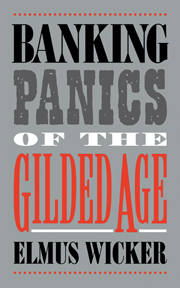Book contents
- Frontmatter
- Contents
- Preface
- 1 The Bank Panic Experience: An Overview
- 2 The Banking Panic of 1873
- 3 Two Incipient Banking Panics of 1884 and 1890: An Unheralded Success Story
- 4 The Banking Panic of 1893
- 5 The Trust Company Panic of 1907
- 6 Were Panics of the National Banking Era Preventable?
- 7 Epilogue
- Appendix
- References
- Index
7 - Epilogue
Published online by Cambridge University Press: 21 October 2009
- Frontmatter
- Contents
- Preface
- 1 The Bank Panic Experience: An Overview
- 2 The Banking Panic of 1873
- 3 Two Incipient Banking Panics of 1884 and 1890: An Unheralded Success Story
- 4 The Banking Panic of 1893
- 5 The Trust Company Panic of 1907
- 6 Were Panics of the National Banking Era Preventable?
- 7 Epilogue
- Appendix
- References
- Index
Summary
For almost ninety years Sprague's classic study for the National Monetary Commission has remained the standard work on the banking disturbances of the national banking era. No other American economist had stated either more clearly or more persuasively what the responsibilities were of the NYCH banks as holders of the ultimate banking reserve for the prevention of banking panics. Sprague was simply drawing upon the inspiration he had received from having read the Coe Report, a document he rightly called one of the most important in American financial history. I know of no other that has been more neglected! He recognized immediately the significance of reserve equalization or reserve pooling as a NYCH instrument for preventing banking panics. Sprague, like Bagehot before him, was a merciless critic of the policy of suspending cash payment.
Although Sprague's contributions to our understanding what happened during pre-1914 banking panics were many, there were still some significant lacunae. He made no effort to estimate the number of bank failures, nor did he pay much attention to the location of bank runs and bank closures in the interior. A more serious shortcoming, though not due to any fault of his, was the inaccessibility of information that did not become available until many years later, including the official minutes of the NYCH and biographies and congressional testimony relating to the role of J. P. Morgan and his principal associates during the 1907 panic.
- Type
- Chapter
- Information
- Banking Panics of the Gilded Age , pp. 139 - 147Publisher: Cambridge University PressPrint publication year: 2000

